2016 Activity Report
March Activity Report
March 2017
Global Japan Office Coordinator
Rie Kibayashi
There were no lessons at Rio de Janeiro State University this month either, but at the GJO we planned some lessons focusing on conversation suited to introductory, elementary, intermediate levels once a week as extracurricular activities.
Also, at the beginning of the month was the screening examination for the exchange programme with TUFS, which was taken by more than 10 study abroad applicants. After seeing the enthusiasm of each student, I couldn’t help but think how it good it would be if there were more ways for them to travel to and study in Japan.
From Tuesday the 21st, the high school lessons at the Federal Center for Technological Education of Rio de Janeiro (Centro Federal de Educação Tecnológica Celso Suckow da Fonseca、CEFET) began. This will be a one-year course with two-hour lessons taking place twice a week (Tuesday and Friday). Secondary level Japanese language education is being carried out on the foundation of the activities of the GJO Rio de Janeiro State University GJO. Until now, is has only been carried out at UERJ’s affiliated school, but UERJ and CEFET have formed a link and we have been able to open a new Japanese language course. I hear that, for the generation of students of about high school age, even if they have an interest in Japanese there are hardly any opportunities for them to study it, so the teachers of CEFET were also very happy about the beginning of lessons targeted at high school students. For the morning and afternoon classes, which combined had a limit of 40 places, there were over 300 applicants, and I hear that choosing applicants by lottery was tough.
When it comes to learning Japanese, first of all you must memorise the characters. Transcribing the 50 syllables of Japanese in Portuguese is complicated, so we decided that it would be best to memorise the pronunciation by looking at the hiragana. With that, in March, by practicing writing hiragana and listening to and writing down vocabulary, we gradually got the pupils used to the sounds and characters of Japanese.
The pupils were attentive and listened with extreme diligence, repeating the Japanese they listened to. Also, it seems that the pupils at this school are used to taking notes. For learning a language, 20 people to one class is a fairly large number, but it seems that we will be able to progress with the lessons smoothly.
There is also something that that I would like to arrange with the lessons at CFET on the side of those teaching Japanese. At UERJ, lesson observation is required for students of the teacher-training course, so I will be receiving the participation of those students, but aside from them I would like to have anyone who wants to observe a Japanese lesson be able to join as well.
February Activity Report
February 2017
Rio de Janeiro State University Japanese language education coordinator
Rie Kibayashi
Although we have entered February, the new term at Rio de Janeiro State University still cannot be begun. The economic problems in the state of Rio de Janeiro continue, and there is no sight of a solution.
Amongst this, on Friday the 3rd, we held the course briefing session for new students and briefing session relating to study abroad in Japan for enrolled students at the Japanese department. With studying abroad in Japan from Rio de Janeiro State University, aside from the programme arranged with TUFS, there is the embassy (consulate) recommendation programme. Since we received a visit from a representative from the consulate to explain the programme, it became a fairly big meeting. Including new students, around 30 people attended and were enthusiastically listening to the explanation and asking questions. At the same time, we decided to hand out homework on hiragana and katakana to the new students so that they could do some independent study for a while.
Nonetheless, as much as possible we want to offer chances to come into contact with Japanese, so, although they weren’t official lessons, at the end of the month we held some level-graded extracurricular activities. In the intermediate activity, aside from revising the content up to now, we had the students think of and write down “the kanji of the year”. There was a student who wrote “食” (food) who apparently wants to work hard on her diet. Even though it’s not about enjoying food, it’s an interesting way of thinking. Also, in the introductory activity aimed at new students, I was relieved that there were 6 people taking part. It seems that they had all been studying well by themselves, and when I carried out a hiragana and katakana check, they were able to answer most of the questions.
There are some difficulties on where to carry out these activities. It will always be difficult for students who live far away to participate, and there is some potential uncertainty with security when there are so few people on campus. However, I plan to see how things go and to have activities as regularly as possible.
Meanwhile, negotiations on Japanese education at other high schools is progressing smoothly, and from next month we will be holding a new Japanese course at a national high school called CEFET. It seems that the pupils have a different character to those at UERJ’s affiliated school, so I am looking forward to finding out what kind of lessons these will turn out to be.
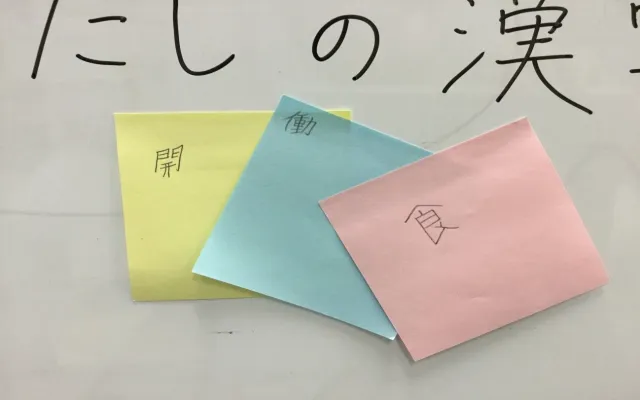
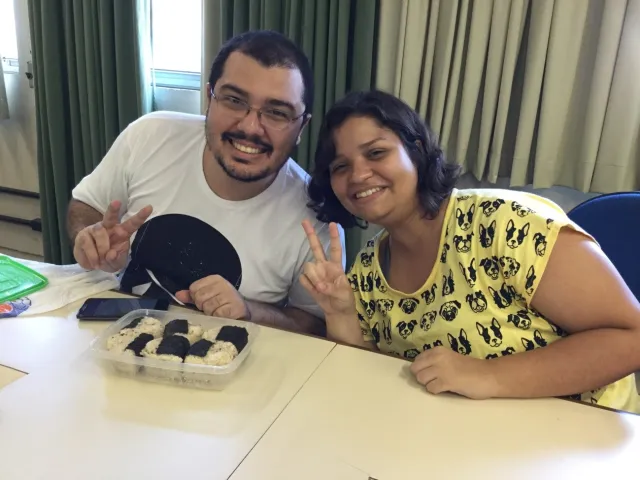
January Activity Report
January 2017
Rio de Janeiro State University Japanese language education coordinator
Rie Kibayashi
On 17th January (Tuesday), we welcomed the second term new students to Rio de Janeiro State University (this term is the second term of the 2016 academic year). I hear that amongst the intermediate level students, there are some who searched and contacted new students from the list of names of those who passed, and gave advice such as what reference books they needed to buy.
Meanwhile, there were some problems at UERJ, and the start of lessons was postponed for two months. However, during that time there were events such as workshops and lecture meetings, and at the Japanese department we held a workshop called ‘Japonês Básico em 50 minutos’ (Basic Japanese in 50 Minutes) on 27th January (Friday).
We didn’t have much time to spread the word, so I was worried about how many people would come, but on the day over 70 people joined, and it was a great success. Because there were so many people we couldn’t listen to them all speak, but I still managed to have them repeat back lots of simple Japanese phrases. We dealt with three things, which were greetings, “My name is…”, and “I like/ hate…”. I showed them things such as fruits and vegetables, anime characters, and actors, and asked whether they liked or didn’t like them and had them raise their hands. It was quite interesting how there were lots of people who either liked or hated like famous animes like ‘One Piece’. Finally, we had a fun ending by playing bingo using a hiragana sheet.
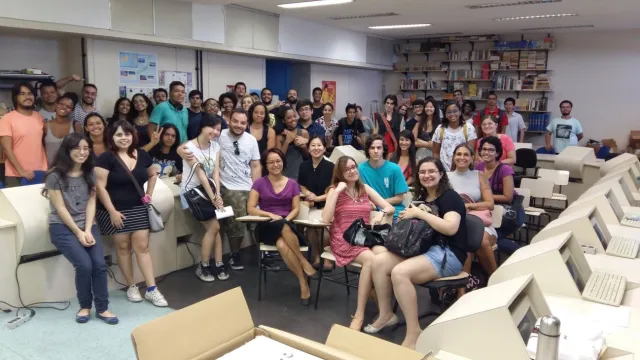
December Activity Report
December 2016
Rio de Janeiro State University Japanese language education coordinator
Rie Kibayashi
The most recent lesson at the affiliated school was covered by some people from NHK radio. They plan to broadcast a special programme at the end of the year about NKH’s ‘Easy Japanese’ series, which we are using as a teaching material. For this visit, I had prepared to have skit presentations and fun games using the Japanese the students have learned up to now, but it didn’t go as planned. First of all, Monday’s class was on the day that the 24-hour strike on 12th December (Monday) was scheduled, so we couldn’t have the final lesson. Then, the last lesson of Thursday’s class was to be on the 8th (Thursday), but at noon on that day there was a shooting incident and the head teacher sent the pupils home early. Because of that, there were few people attending the Japanese lessons, and we decided to cut the lesson, which usually lasts two hours, short to one hour. Even so, in that short time I am glad to say that we were able to go over the content up to now and act out some fun skits. The students’ thoughts were broadcast on 26th December in a special report on NHK World (Radio Japan).
https://www3.nhk.or.jp/nhkworld/pt/radio/japanese/201612150600/
Also, this month, as a new Japanese language course location, I visited a school called CEFET. I heard that CEFET is a national science high school, but when I actually visited to speak to them, it was a large school which also offered university level courses. I was had the pleasure of speaking face-to-face and hearing that they are on the lookout for international things, and would like to hold Japanese language lessons. From now on, I think we will move towards realising these.
November Activity Report
November 2016
Rio de Janeiro State University Japanese language education coordinator
Rie Kibayashi
The focal point of the activities at GJO Rio de Janeiro State University is carrying out Japanese language lessons at secondary education. Offering Japanese language education to students not yet in university is something that has been considered and tried out for many years at UERJ’s Japanese department. Form last month, UERJ was able to start Japanese lessons at its affiliated school (CAp UERJ), but this month] we investigated into whether we can more hold lessons in multiple schools instead of just one place. Luckily, we have found a route towards negotiating with another school, and fro that we have been arrangements such as drawing up a model Japanese course and fixing visiting days.
At the moment, the lessons at the affiliated school (CAp UERJ) are held just once a week, but perhaps because the pupils have gradually come to memorise the vocab, they have started to actively speak Japanese and have come to voluntarily participate in skit practices.
Also, this month at UERJ, due to various circumstances there have been numerous one-day or half-day strikes. In general, during the strikes there are no university lessons. However, after discussing with the teachers at the Japanese department, we decided to hold the Japanese lessons at the GJO regardless of whether there is a strike or not. There are complex situations of the kind that could only occur in this region, but I hope to be able to support students who want to learn Japanese as much as possible.
On 23rd November (Wednesday) 2016 I attended the Japan study abroad fair held at the University of Campinas in São Paulo State, Brazil (sponsored by Tsukuba University) and gave an explanation of TUFS’s study abroad programme as well as an introduction to the activities of the Global Japan Office (GJO) at Rio de Janeiro State University (UERJ). The office was established in March 2016 as a base for carrying out Japanese research and Japanese language education in the Brazil-wide network. TUFS was the first university to present at the fair’s information session. Among six universities, we were the only one to present in Portuguese, so the presentation was easy to understand and had an impact on the students attending. Also, the thing that gained the most attention in TUFS’s presentation was the Reinventing Japan Project (Central and South America), “a co-creative education program of humanities and sciences to solve global issues confronting Japan and Latin America” (La-CEP). La-CEP is a project to jointly foster human resources with practical vision and an active role in the global community to solve global-level issues that affect Latin America and Japan. It includes one month of education in Japanese language and affairs, including an internship in business, with a monthly scholarship of \80,000 plus travel expenses to and from Japan. To Brazilian students who want to study abroad in Japan but have financial concerns, this seemed to be a very attractive project. As a result, the number of students who came to have individual consultations in the afternoon exceeded my expectations. The TUFS booth was crowded with students who were coming to receive information right up until closing time, and the students who came to hear explanations were never-ending. Also, the mascot promoting TUFS, Tobita, was extremely popular, and all the students who laid eyes on him said “Que bonitinho! (how cute!)”.
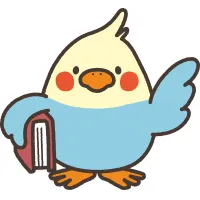
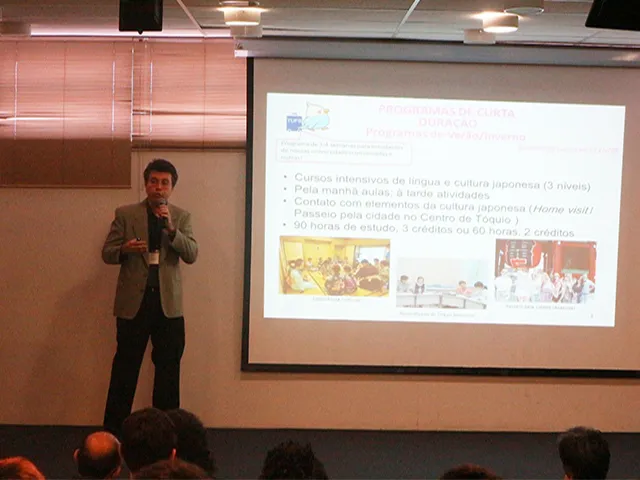
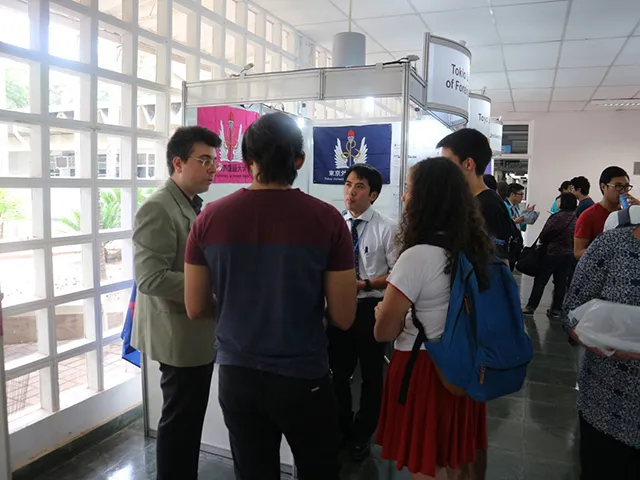
October Activity Report
October 2016
Rio de Janeiro State University Japanese language education coordinator
Rie Kibayashi
A strike has been going on for a while at Rio de Janeiro State University, so now the university’s schedule has become irregular. For example, after the end of term in December is the summer holiday, and usually the new term begins in March, but in order to leave space for the strike, next term will begin slightly early in January.
The Japanese language lessons at UERJ’s affiliated school, which were scheduled for October, were also affected by the strike. At first, we was thinking of having lessons targeted at high school students, but the high school curriculum is so packed that pupils have no room for extracurricular classes, so there weren’t many applicants. So, instead we decided to take middle school student applicants, and to begin the lessons from the 20th (Thursday). Now, we have seven people to a class and we hold Japanese language lessons once a week.
At UERJ there are teacher training courses, and there is system whereby students who receive a scholarship teach foreign languages. Students enrolled in the teacher training course are in charge of teaching pupils in these lessons too.
September Activity Report
September 2016
Rio de Janeiro State University Japanese language education coordinator
Rie Kibayashi
The Japanese coordinator took up the post at Rio de Janeiro State University in the end of September.
The language classes at the UERJ’s Japanese department are split into elementary 1, elementary 2, intermediate, and advanced (aside from those, like TUFS there are literature, sociology and etymology classes). Also, there will be new Japanese language classes at affiliated schools. So, in September I was mainly making arrangements for 1: supplementary classes at UERJ’s Japanese department and 2: the Japanese programmes at affiliated schools.
With regard to 1, we will be holding conversation classes that match the level of students in each class from October. I had the pleasure of observing several lessons, and I admired how the students were working hard in a place far removed from Japan in an environment that seems to have few similarities to Japan. I want to endeavour to help them enjoy studying Japanese even more. As for 2, as we head towards the start of lectures on 17th October (Monday), I want to do things such as make rough plans for the course of lessons and research teaching materials with the teachers in charge. On teaching materials, the plan is to use the Portuguese edition of NHK’s ‘Easy Japanese’ (http://www.nhk.or.jp/lesson/portuguese/). I want to think of many different methods to increase interest in Japan and the Japanese language among high school students as well.
May Activity Report
May 2016
GLOBAL JAPAN OFFICE – RIO DE JANEIRO
This report is to present the activities carried out and those that were started during the month of May 2016. It is structured into four groups of activities: (a) activities that are directly related to the TUFS; (b) activities that serve as support for Japanese universities; (c) activities to promote the teaching of the Japanese language and culture; (d) others.
(a) Activities that are directly related to the TUFS
• Arrangements to receive Professor Kibayashi in September.
Given the stay of Professor Kibayashi from September on, we initiated contact with the Coordinator of Education and Humanities Center, Professor Lincoln Tavares, as well as with the Director of the Department of International Cooperation, Professor Cristina Russi, so that an appropriate letter of invitation can be issued, respecting the bureaucracy of UERJ, to receive Professor Kibayashi as a visiting Professor. Moreover, we began research on accommodation, considering value and location.
• Implementation of a course of Japanese language at the UERJ’s elementary and high school, called CAp UERJ.
Established preliminary contact with CAp’s Principal to discuss the implementation of the Japanese language course at Cap. The course will be destined to pupils of elementary and high school.
• Request for NHK educational materials
Contact with the Department of Multi-Language and multimedia of NHK, seeking for authorization to use and apply the material やさしい日本語 for Japanese language teaching at schools in the State of Rio de Janeiro, including Cap-UERJ.
• Incipient planning to decide on the entrance exam of students of Cap, who wish to study at TUFS in 2017.
In internal meetings, we begin to establish criteria to select students of CAp-UERJ who wish to participate in the selection to attend the graduation at TUFS. We have discussed the composition of the examination board, documentation and skills to be required of students and the period in which the selection will occur. We are also encouraging the contact between Brazilian students that are studying at TUFS at the moment, with students from the last year of high school at CAp. We expect that students who are living in Japan can report their experiences to those that dream to study in Japan.
• Search for possible candidates for the Nikkeijin scholarship.
In Rio de Janeiro there are not many Japanese descendants like some other States in Brazil. However, there are always undergraduate students at UERJ with Japanese ancestry, which can be evidenced by the surnames on the list of candidates passed the entrance exams. As information on the ethnicity of students is not included in the institution’s database, we are looking through the list surnames of Japanese origin to then make a database of nikkeijin.
• Update mailing list
We seek to update the mailing list of members of the Japanese community in Rio de Janeiro, as well as students of the Japanese language and supporters of Japanese culture, in order to inform this public about events on Japan.
• Contact with TUFS language volunteers
First contact with the person in charge of the Rio Study Tour, that is a summer class sending language volunteers from TUFS to Olympics and to Paralympics.
(b) Activities that serve as support for Japanese universities
• New agreements with Japanese Universities
Establishment of agreements with two Japanese universities: Kanazawa University and Shikoku University, with the aim of promoting the internationalization of the Brazilian and Japanese universities. In the last week of May, an agreement was signed with the University of Kanazawa, while the University of Shikoku is in the final stage of drafting the agreement.
Planned projects to be developed together with the Japanese universities: institutional exchange between the teaching staff, technical and administrative staff and students at the undergraduate and postgraduate levels; development of teaching and/or research activities related to the areas of teaching and study of UERJ and of the Japanese universities; organization of symposia, conferences and short-duration courses in research areas; promotion of technical, scientific and cultural activities which are open to the public; provision of opportunities for training teachers and researchers by creating high-level specialized courses; provision of training and refresher courses, as well as fostering the opening of inter-institutional lines of research associated with local postgraduate programs; promotion of joint publications; exchange of information pertaining to the teaching and research at each institution.
(c) Activities to promote the teaching of the Japanese language and culture
• Portuguese language for exchange students from Japan
Despite the current strike at UERJ, we got the collaboration of the Department of Portuguese for foreigners, so that the Department Coordinator, Professor Alexandre do Amaral Ribeiro, accepted to teach Portuguese to the two exchange students from TUFS as well as to the exchange student from Waseda University. Classes began at the beginning of May.
